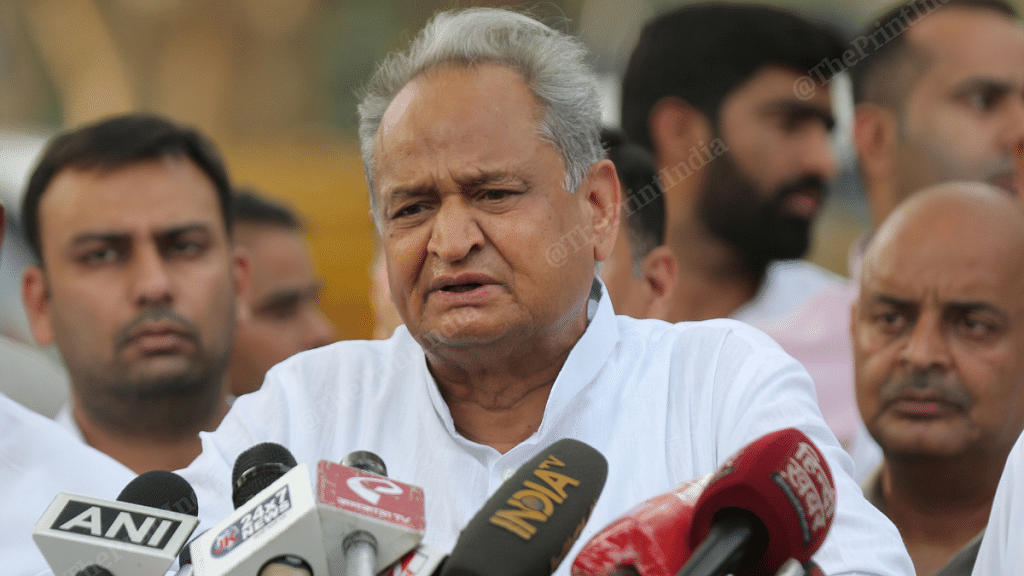Rajasthan is yet to go out on the hustings, but the politics over the 2019 Pulwama attack is once again being played out in a theatre of the tragic. It could easily have fallen into the theatre of the absurd, but for the fact that central among those on stage were three women whose husbands were Central Reserve Police Force soldiers who lost their lives in the car bomb attack on 14 February 2019. Madhubala Meena lost Head Constable Hemraj Meena, while Manju Jat’s husband was Constable Rohitash Lamba, and Sundari Devi lost Constable Jeet Ram Gurjar. Their loss cannot ever be compensated.
The theatre enacted on the streets of Jaipur, nevertheless, was overcompensation. And the fact that the Government of Rajasthan, headed by Congress’ Ashok Gehlot, should enable two of them to get more. On the day of the attack, CRPF lost 40 troopers, of whom five were from Rajasthan. The families of Head Constable Narayan Lal Gurjar and Constable Bhagirath Singh haven’t been seen to make any additional demands and haven’t participated in any of the street demonstrations either. Nor, for that matter, have the other 37 wives of the dead soldiers been known to stage the ubiquitous protest form of dharna. Of the three, two have placed a similar demand — jobs.
Also read: Pulwama widows’ demands inappropriate, BJP using them for political gain, says Rajasthan CM Gehlot
Will advantages open Pandora’s box?
Under any circumstances, the issue of jobs would not have featured in any discussion since that is a sine qua non in any compensation package. And it has featured so from the time television brought war home during the 1999 Kargil campaign. It is also part of the package offered in Rajasthan, apart from financial and other allocations. This includes Rs 25 lakh in cash and a similar additional amount if the wife of the deceased does not want irrigated land or medium income group urban house. Another Rs 5 lakh for the parents in a post office savings account, and one child secured.
Then there is the small feature of a lifetime Rajasthan Roadways bus pass, and finally what really catches the attention in rural Rajasthan — statues and the renaming of schools or colleges after soldiers. Madhubala Meena has had a college in Sangod renamed after her husband, besides two statues installed at the college and at a park set up in the ancestral village of Vinod Kalan, all in the Kota district. Her presence on the streets is motivated by a desire to have a third statue installed at a public square in Sangod town, which obviously has been denied to her by the district administration.
Manju Jat wants a job for her younger brother-in-law, and so does Sundari Devi. The law in Rajasthan precludes anyone from availing of the opportunity but for the wife and a child. There have been no known instances of compromises on this score when it comes to compensating soldiers’ families, and any succumbing to pressure this time around will open a Pandora’s box, socially. The fact that this demonstration of demands has happened under the guidance of a senior Rajasthan politician is dodgy enough, but what makes it even more dubious is the opening of avenues for further exploitation.
Don’t succumb to pressure
Both Manju and Sundari have minor children who stand to benefit from assured employment once they attain adulthood. Whether they avail of it or not is a different matter altogether, for not all options are kosher for all applicants. More on that later. The cruel reality of life for a soldier’s wife in India is in stark contrast to all that flag-waving merriment practised in the name of patriotism. The soldier-husband is often the only earning member in the family, and the pay commissions have ensured that it is a substantial package for rural consumption standards, thus sparking jealousy.
More often than not, the woman and the children are denied the full benefits of the earnings. And God forbid if the soldier dies on duty. For the surge of cash and other benefits is too much for human greed to prevail over temptation. Now she has to be bound within the in-laws’ home. And that is where the pressure to get a job for the brother-in-law comes in, over and above the interests of her children. I met Manju ji thrice in 2022, always with the hovering presence of her brother-in-law. Each time, I requested her to think about her child.
The death of the husband is cruel enough for most women in India, and more so when other factors step in to dictate actions. Acceding to this demand, therefore, will turn it into a pressure tactic in more families with such women. While it isn’t the job of the State to patrol families, it can certainly ensure that all possible loopholes are closed for exploitation of such tragic circumstances. Some soldiers’ wives are better educated, so they don’t avail of the job offer, which is where the State can do more to help them. True honour comes from giving them commensurate employment.
The jobs on offer are what government language officially calls Pay Matrix L-10, Group C and D. They were once called Class III and IV. Little wonder that many women are loathe to exercise such options. Given their educational qualifications, and the circumstances of their sacrifice in the service of the country, such women should be absorbed into the fold without having to undergo more hardships and stresses of examinations. It is better to compromise on these rules and regulations that will empower a disadvantaged woman rather than succumb to pressure and encourage exploitation.
Manvendra Singh is a Congress leader, Editor-in-Chief of Defence & Security Alert and Chairman, Soldier Welfare Advisory Committee, Rajasthan. He tweets @ManvendraJasol. Views are personal.
(Edited by Humra Laeeq)
